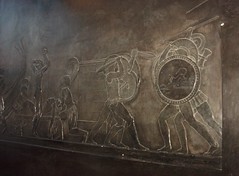May 23, 2009
Selecting Supersoldiers
 I'm quoted in Harnessing science to create the ultimate warrior - New Scientist. The article is about an interesting new report, "Opportunities in Neuroscience for Future Army Applications" from the US National Academies of Science (NAS). Lots of neuroethically relevant stuff there.
I'm quoted in Harnessing science to create the ultimate warrior - New Scientist. The article is about an interesting new report, "Opportunities in Neuroscience for Future Army Applications" from the US National Academies of Science (NAS). Lots of neuroethically relevant stuff there.
One pernicious cliché is people born and bred to be perfect soldiers. This presupposes a level of long-term planning that is unlikely to be workable for any modern military force. In the far past war might have been unchanging enough that one could reasonably run a Spartan upbringing and expect the children to grow up to be suitable soldiers (ignoring the failures, of course). But today the military and political situation is changing much more rapidly. It is possible that most soldiers of the future might spend their time running drones in shirtsleeves at home. Or they might be managers, directing dozens of more or less intelligent AI devices. Or they will be out in the field like now, but supported by vast collective systems. It is hard to predict what will work. But that also implies it is equally hard to predict what would make a "perfect" soldier. Worse, 20 years time is eternity in politics, which means that the long-term plan could be uprooted by a new administration. "Sorry guys, but your supersoldiers do not fit in with the new administration's 'soft power' policy" or "Sorry, but the new El Presidente do not think your supersoldiers will be loyal to him".
This is why developing better selection procedures makes much sense. The US army has a rule against recruiting sub-80 IQ soldiers based on practical experience: they are simply too expensive to train well. Similarly there is a lot of other knowledge out there about what makes a good soldier (e.g. adaptability, willingness to be part of a group, good stress management etc). Right now this evaluation is done using various psychological tests, but if it could be made more accurate using genetic or physiological tests, is there really any difference? The goal is to get the best possible estimate of whether the person would fit the present model of the army.
The big question is of course whether you could actually test well enough. Extra information is not always helpful if it is noisy. If there are non-linear interactions (say that trait X and Y each are good, but the combination X+Y is bad) or an environmental interaction this might be hard to detect in the data and used in the evaluation procedure. Just like genetic discrimination for jobs make little sense given that interviews, CVs and actual skills give much more relevant information than genetic propensities, it could very well turn out that the benefit of genetic selection in the military would be weak. It might make more sense in sport, where the number of relevant traits likely are low in some sports (e.g. for a sprinter explosive power, reaction time and personality might be key).
The real supersoldier is of course the supercivilian. Wars are essentially struggles between metaorganisms, and the infrastructure behind the soldiers has enormous importance for their ability to project force. If one side can marshal more human capital into the war effort than the other, then it will likely win - it can build more kit, it can recruit more and better soldiers, it will act more efficiently and it will be able to absorb damage better. Armies are a small fraction of their society (although they do tend to get more attention) so a boosted society will likely produce far more utility than a boosted army, especially when there are network effects. There might still be a need for a guy with a rifle somewhere, but his power will be strongly affected by how much power his compatriots have.